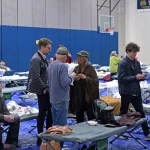Parnell Palme McGuinness, a communications specialist, made the remarks in response to an emotional please from an audience member, who opened up about her brother’s death to coronavirus. “I am so, so sorry to hear about your brother,” Ms Palme McGuinness said on Q&A. “I think we need to bring people home as quickly as we can. I think it’s so important for the Australian government to say these are our residents, these are our citizens … they are in trouble and we need to help them come home.“It’s devastating that flights have been cut rather than increased.“This is a decision about cutting off flights, which is just unconscionable. They are flying supplies to make vaccine and provide oxygen to India. And the planes are coming back empty.“They need to be coming back filled with people who need help.”Her comments came after Q&A audience member Farida opened up about her family’s COVID tragedy. “Last week I lost my brother,” Farida told the ABC TV audience. “He was a doctor and he was serving homeless patients.“He passed away due to the shortage of beds and oxygen in the hospitals. Mismanagement of essential needs has taken his life.”Meantime, the Prime Minister vowed to slam shut travel loopholes allowing passengers from the coronavirus-plagued subcontinent to fly into Australia.Scott Morrison said his government moved swiftly to stop one of the loopholes in Qatar after Aussie cricketers Adam Zampa and Kane Richardson landed in Australia on Thursday afternoon after choosing to exit the Indian Premier League cricket tournament early.They arrived in Melbourne on a flight from Doha.This comes despite Australia slamming its border shut to India until May 15 in a bid to stop the virus spreading into the Australian community.India’s healthcare system is at breaking point with millions of infections raging across the subcontinent – the country recorded 379,459 COVID-19 cases on Thursday.“This was one (loophole) that became apparent to us on Wednesday, we have since closed it off at 7pm on Wednesday – the cricketers got away just before that,” Mr Morrison told 2GB.“We had information on Monday that wasn’t possible … I’m advised there is a 14-day requirement when someone goes into Doha, but that wasn’t being applied to transit passengers.”Mr Morrison said his government would be taking “more action” on transit passengers later on Friday when he speaks to the premiers at national cabinet.“We’ve already directly dealt with the airlines in Qatar and so those transit passengers – the airlines advised us – are no longer coming through from Doha,” he said.“The places they are potentially coming from are Singapore and Kuala Lumpur, and our advice is that those routes are closed off.“I propose to take further action today which will be done under the biosecurity act.”BLACK MARKET FEARSAs Poonam Sinha fought for her life, her distraught son found himself fending off black marketeers for coronavirus drugs after the Indian hospital treating her ran out of supplies.Dire medicine and oxygen shortages as India battles a ferocious new COVID-19 wave mean boom times for profit gougers, although some young volunteers are doing their best to help people on Twitter and Instagram.In the eastern city of Patna, Pranay Punj ran from one pharmacy to another in a frantic search for the antiviral medication remdesivir for his seriously ill mum.He finally located a pharmacist who said the drug could only be found on the black market, and offered to source it for an eye-popping 100,000 rupees ($US1,340), over 30 times its usual price and three times the average monthly salary for an Indian white-collar worker.Punj instead got the medicine from a distant relative whose wife had just died from the virus.But the nightmare was only beginning.In the middle of the night, he got a call informing him that the hospital had now exhausted its stock of oxygen, making his mother’s condition even more precarious.“Several hours later, we managed to procure one bed at (a) very high price in a private hospital and moved her there,” he told AFP.OXYGEN SUPPLIESSimilar heart-rending scenes are unfolding across the country, with desperate people taking to social media to beg for beds, oxygen or medication.Despite India’s status as the “pharmacy of the world”, the biggest producer of generic drugs has been unable to meet the demand for antiviral medication such as remdesivir and favipiravir.In the northern city of Lucknow, Ahmed Abbas was charged 45,000 rupees for a 46-litre oxygen cylinder, nine times its normal price.“They asked me to pay in advance and pick it (up) from them the next day,” the 34-year-old told AFP.The crisis has added to criticism of Prime Minister Narendra Modi, already under fire for allowing huge religious gatherings and addressing crowded political rallies himself.Commerce Minister Piyush Goyal last weekend hit out at “doctors giving patients unnecessary oxygen”.“Patients should only be given as much oxygen as they need,” Goyal told reporters.New Delhi is now planning to import 50,000 tonnes of oxygen and has set up a special train service called the “Oxygen Express” to transport cylinders to hard-hit states.Modi said in an address to the nation on Tuesday night that “all efforts are being made” to boost supplies.“One solution to this crisis was to create a stockpile of antiviral drugs when cases were low, but that did not happen,” said Raman Gaikwad, an infectious diseases specialist at Sahyadri Hospital in the western city of Pune.Instead, remdesivir manufacturers told the Indian Express this week that government officials had ordered them to cease production in January because of a fall in infections.INDIA VACCINE IMPACT The global vaccination program for COVID-19 could be in jeopardy unless the outbreak in India is controlled, a leading Australian epidemiologist has warned.Professor Mike Toole, from the Burnet Institute, said the world is facing “a race between vaccines and variants.”He is one of more than 700 doctors, health care groups, and charities who have signed an open letter to Prime Minister Scott Morrison calling on him to immediately waiver intellectual property rights on COVID-19 fighting tools such as vaccines and diagnostic equipment amid fears the India crisis cannot be controlled.The call for action comes as the World Trade Organisation is due to meet tomorrow to discuss forcing nations to waiver any blocks on the COVID technology and it is appealing to Australia to support the motion.Professor Toole, who has more than 40 years’ experience in international health including communicable disease control (including HIV), maternal and child health and nutrition, and public health in emergency settings, said the outbreak in India and Brazil must be controlled to stem the pandemic.He said the biggest threat from letting the outbreaks run out of control is the potential for the virus to mutate randomly and spread.NED-3691-Indias-COVID-19-NightmareAlready Professor Toole said there is a new variant from India, B1617, and it has spread to other countries. Both India and Brazil have long porous borders and it is impossible to stop the virus escaping into other countries, he said.Professor Toole said the longer the virus is uncontrolled the more it is likely to mutate and resist antibodies built up from the vaccines and render the global vaccination program useless.“The more we allow it to mutate the more new variants will evade the immune response mounted by current vaccinations.”He said in India last week 25 doctors were infected with COVID-19 despite already being vaccinated.The open letter to Mr Morrison was co-written by Médecins Sans Frontières/Doctors Without Borders (MSF) and the Public Health Association of Australia (PHAA) and it urges the Australian Government to take a stronger leadership role by supporting proposals such as the temporary removal of intellectual property rights over COVID-19 medical tools.It argues that it is critical that the Australian Government listens to the experts and uses all of its available political, financial and legal leverage to get more vaccines and other medical tools to the countries most in need. NED-2170 How coronavirus mutatesThis will in turn help protect all countries from emerging variants of COVID-19.As the humanitarian crisis in India continues to worsen, UNICEF Australia yesterday launched the India COVID-19 Crisis Appeal to provide lifesaving assistance to people affected by the deadliest days of the pandemic so far in India. “Families and communities in India are in desperate need of assistance,” UNICEF Australia’sDirector of International Programs Felicity Butler-Wever said. “As cases are rising exponentially, many more people will die if we do not send urgent help and children could be left without their families if we do not reach them in time.”Read about the UNICEF India appeal here.
Powered by WPeMatico






